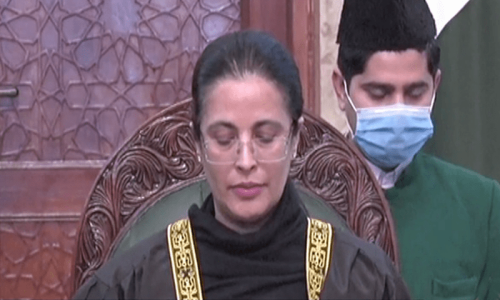• SIC wants dissenting judges be asked to sit on review bench in reserved seats case
• LHCBA claims fresh oath to transferred judges ‘never discussed’ with CJP
ISLAMABAD: Justice Aminuddin Khan, a member of the 11-judge constitutional bench (CB) hearing a set of review petitions against the Supreme Court verdict on reserved seats of the National Assembly, on Monday said that after the 26th Amendment, review petitions could be heard even by a bench smaller than the original bench.
Even a smaller bench comprising eight or nine judges could hear the matter after the 26th Amendment, Justice Aminuddin reminded Sunni Ittehad Council (SIC) lawyer Faisal Siddiqui who had earlier filed objection to the composition of the existing 11-judge constitutional bench.
The counsel questioned how a bench less in strength than the original bench could overrule earlier decisions.
Justice Jamal Khan Mandokhail wondered if the Constitution or the Supreme Court Rules would prevail after the 26th Amendment, also reminding the counsel that no rules had been framed by the committee established under Article 191-A of the Constitution.
The SIC lawyer argued that it was not the SC Rules but the jurisprudence rather the constitutional convention laid down by the apex court itself that the review petitions should be heard by the bench that should be the same in numerical strength as that of the original bench.
The debate regarding the composition of the bench surfaced after the strength of a 13-judge bench, which took up the review petitions, was reduced to 11 considering that two of its members — Justice Ayesha A. Malik and Justice Aqeel Ahmed Abbasi — dismissed the review petitions on the first day of the hearing.
The original petition, moved by the SIC regarding reserved seats in the National Assembly, was decided by a 13-judge bench on July 12, 2024.
Two judges don’t want to sit on review bench
During the hearing of the review pleas, Justice Amin claimed that the present 11-judge bench was reconstituted on the desire of the two judges who dismissed the review petitions since they did not want to sit on the present bench. Justice Musarrat Hilali added that the two judges had even declined to issue notices to the other side on the very first day of hearing of review petitions.
The counsel said the two judges, who rejected the review petitions, could not be excluded from the constitutional bench. He said the two judges should be asked by the present bench to rejoin the hearing and if they still refused, their decline should be considered a recusal on their part.
Mr Siddiqi also said the SIC had not challenged the integrity of the judges sitting on the constitutional bench rather the party objected to the “erroneous constitutional reading”.
He reiterated the review jurisdiction principle that a bench with less members than the original bench cannot hear review petitions.
Justice Muhammad Ali Mazhar questioned how the two judges who had already dismissed the review pleas be asked to continue to hear the same.
“Of all the 15 judges of the constitutional bench, the present 11-judge bench was constituted on the basis of available judges since two judges could not sit as they heard the matter in the Peshawar High Court (PHC) while the other two rejected the petitions on the first day of hearing,” Justice Mazhar explained.
Matter of first impression
Justice Mandokhail reminded that the present case was a matter of first impression, which whenever decided would define the future course.
As Justice Amin remarked that the dismissal orders by the two judges would be counted in the main verdict, Justice Mazhar explained that Justice Malik, in her dissenting note, did not
agree to the observation that dissenting judgement would be counted at the end of the hearing though “propriety demands that their dissenting order should be counted”.
Justice Mazhar also wondered if the two judges would sit on the bench as a silent spectator, asking the SIC lawyer to come up with a practical solution to settle the issue.
In response, the SIC lawyer, who had earlier challenged the composition of the 11-judge bench, said the matter should be referred back to the Judicial Commission of Pakistan (JCP) for the appointment of two more judges to the CB to ensure the review bench has the same numerical strength that the original bench had.
Objections to court priorities plea
Senior counsel Hamid Khan, meanwhile, apprised the bench that the registrar office had objected to his application seeking court decision on the 26th Amendment before determining the reserved seats case review.
He had filed the plea on behalf of the SIC before senior counsel Faisal Siddiqui challenged the composition of the 11-judge bench. He said the objections raised by the registrar office was that the SIC application was not just ‘sluggish’ but also ‘scandalous’.
The case will be taken up on Tuesday at 11:30am.
Judges’ seniority case
Separately, a five-judge constitutional bench, headed by Justice Muhammad Ali Mazhar, postponed further hearing on a dispute regarding inter-se seniority among Islamabad High Court (IHC) judges for Tuesday.
The counsel, who was representing the Lahore High Court Bar Association and the Lahore Bar Association, earlier claimed that the issue relating to the administration of a fresh oath to the transferred judges was “never discussed” rather kept away from Chief Justice of Pakistan Yahya Afridi and the chief justices of the relevant high courts when their consent was being sought for the judges’ transfer to the IHC.
The bench suggested the counsel to furnish written formulations.
Published in Dawn, May 20th, 2025















































